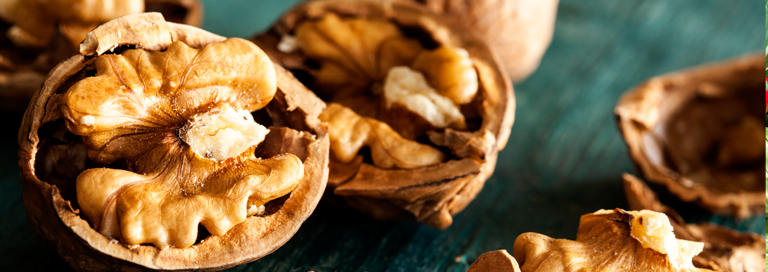A new study out of Marshall University found that eating two ounces of walnuts a day for two weeks slowed breast cancer growth or reduced the risk of developing the disease.1
In the study, researchers gave a group of women who had a breast biopsy two ounces of walnuts every day until they had surgery two weeks later.
They found significant changes in the tumor’s gene expression in the women who ate the nuts compared to those who didn’t.
This backs up earlier research which found that eating two ounces of walnuts a day could help cut breast cancer risk in half.2
Extracts of walnuts stopped the spread of breast cancer cells.3
Walnuts contain a trio of cancer fighters – phytosterols, flavonoids, and omega-3s.
Phytosterols. Studies show that these nutrient compounds can inhibit tumors from forming in the breast and shrink them if they are already there.4 In addition to walnuts, you can find phytosterols in:
- Legumes
- Flax seed oil
- Peanut butter
- Pistachios
- Sunflower seeds
- Almonds
- Brussels sprouts
Flavonoids. Walnuts also contain a flavonoid called ellagic acid. This powerful flavonoid inhibits the growth of cancer cells.
For example, a certain kind of microRNA signal is a marker for developing breast cancer.
In a new study, not only did ellagic acid stop breast cancer tumor formation, but it also reversed the dysfunction in the microRNA!5
Ellagic acid not only protects your healthy cells from free radical damage, but it also helps to detox would-be cancer-causing cells and helps prevent cancer cells from reproducing.
Other ellagic acid-rich foods are blueberries, cranberries, raspberries, strawberries, pecans, and pomegranates.
Omega-3s. Omega-3 has a unique ability. They can get absorbed into cell membranes, where they help cancer cells self-destruct. They reduce an inflammatory enzyme called COX 2, which promotes breast cancer.
In one animal study, mice bred to have breast
cancer got lifelong omega-3 supplementation and were able to prevent breast cancer. Those that got cancer had a reduction in the size and number of tumors.6Plus, omega-3s keep your body’s breast cancer genes healthy. When these genes function normally, they help repair DNA and prevent cancer from developing.
You can get omega-3s in these foods:
- Wild-caught salmon, anchovies, sardines
- Grass-fed beef and organ meat
- Almonds and pecans
- Avocado
- Sacha Inchi oil
- Cod liver oil
- Olives/olive oil
Working all of these foods into your diet will help protect your body from cancer. Still, walnuts are the only food that offers all these cancer-fighting compounds in one.
Follow These Tips To Get The Healthiest Walnuts You Can
To get the freshest, most nutritious walnuts, follow these tips:
-
- Look before you buy. If you’re buying walnuts in the shell, make sure the shells don’t have any defects – look for little wormholes. Give the shells a little shake. If they rattle when you shake them, they are probably old and over-dried.
- Store shelled walnuts in an airtight package. You can store them for about six months if you keep them in the refrigerator. And up to a year in the freezer.
- Check the date if you bought them with the shell removed. If you prefer unshelled walnuts, look for a freshness date on the package. Heat and humidity will speed up the spoiling process. As with the shelled walnuts, keep them in an airtight container in the refrigerator, and they will last for several months, too—longer in the freezer.
Aside from popping a handful of walnuts in your mouth, there are many ways to enjoy them.
Sprinkle a handful on your salad or yogurt, or experiment with your favorite recipes. I like to add them to chicken salad or sautéed vegetables.
To Your Good Health,
![]()
Al Sears, MD, CNS
References:
1. Hardman E, et al. “Dietary walnut altered gene expressions related to tumor growth, survival, and metastasis in breast cancer patients: a pilot clinical trial.” Nut Res. 2019;66:82-94.
2. Hardman E, et al. “Dietary walnut suppressed mammary gland tumorigenesis in the C(3)1 TAg mouse.” Nutr Cancer. 2011;63(6):960-70.
3. Vanden H et al. “Mechanistic examination of walnuts in prevention of breast cancer.” Nutr Cancer. 2012;64(7):1078-86.
4. Awad, A et al. “β-Sitosterol activates Fas signaling in human breast cancer cells.” Phytomedicine. 2007;14(11): 747-754.
5. Munagala R, et al. “MicroRNA ‘signature’ during estrogen-mediated mammary carcinogenesis and its reversal by ellagic acid intervention.” Cancer Lett. 2013 Jun 18. pii: S0304-3835(13)00462-X.
6. MacLennan M, et al. “Mammary tumor development is directly inhibited by lifelong n-3 polyunsaturated fatty acids.” J Nutr Biochem. 2013 Jan;24(1):388-95.

